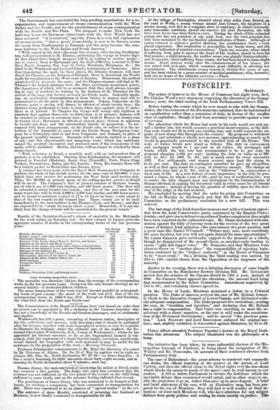POSTSCRIPT. SATURDAY.
The points of interest in the House of Commons last night were, first, Sir -Charles Wood's new statement reseting the alteration of the Stamp.. duties ; next, the third reading of the Irish Parliamentary Voters Bill.
Before stating the -course which he now meant to take with the Stamp, duties, the Onanconserc of the .EXCHEQUES explained, that he had intended an mpialization rather than a remission of duty, in favour of the smaller Class of capitalists; though it had been necessary-to-provide against a loss of revenue.
The alteration which the House had made in his scale would not only en- tail a further loss, but would-occasion a practical inconvenience, as the shil- ling scale would not lit in-with-any existing sum, and would occasion the ex- pense anew stamp-dies throughout the country. He proposed-to withdraw the bill, and substitute a wholly new measure, approximating as nearly as it would lse,praetically convenient to the recorded wish of the House. The scale of duties would now stand as follows. The duty on conveyances and mortgages would be 1 per cent on all values. On mortgages and bonds, which the late vote 'had recommended to 'be ls. per cent, lie proposed charging 1-8th per cent ; (making the dirty on value up to'-50f. only Is. 3d.) for IOU 2s. Sd., and as much more for every successive 100/. For settlements and money secured upon land 'the stamp to be 68. per mut The duty on contingent annuities he gave up altogether, as well as that upon leases for a year, of whatever amount. The stamps on memorials were kid at 2s. 6d., and on the "followers" in conveyances a fixed sum of 108. As a new feature of:some importance in the bill, lie pro- mised a clause, by which a sum of 10s.,.paid by way of verification-fee, was to render the duty charged upon any Instrument by the Commissioners of Stamps -effectual in making the document valid in every court for all intents and purposes ; instead of leaving the question of validity open for the deci- sion of the judge at the last moment. Be concluded by moving that the order for going into -Committee on the bill on Monday be discharged, and that the House should go into Committee on the preliminary resolution for a new bill. This was ordered.
The last stage-of the Irish franchise measure met with a vivacious opposi- tion from the Irish Conservative party, reinforced by the English Protec- tionists; and gave riseto defensive speechesof fresher complexion than might have been expected on the exhausted topic. Mr. Sawn, declaimed with ani- mation agamt the folly of leaving room for the revival of the two great causes of defunct Irish agitation—the eoricurrenee of a great question and a great manlike Daniel O'Connell : "Nature may once more contribute the same faculties, but you will not again furnish-the same opportunities." Sir dunes Goanam gave serviceable' support to the measure as a whole, though he _disapproved of the second clause, as mischievously tending to create "split and faggot votes." Mr. Door Aar I said that Ministers were about to throw on "another place" the responsibility of rejecting legis- lation confessed by the "highest authority" in the House of 'Commons to be "most crude." On a division, the third reading was carried, by 254 to 186—amidst cheers from the Opposition at the largeness of the minority.
Earlier hi the evening, there was a debating discussion of some length in -Committee on the Manchester Rectory Division Bill. Mr. Gooneunar moved that the salaries of the Canons-should be 7501. a year, instead of 6001. Sir Gaonoa GREY opposed the alteration,- the amount fixed being that recommended by the Select Committee. Amendment negatived, Isiy 193 to 60 ; and remaining clauses agreed to.
In the House of Lords, Ministers sustained a defeat on a .CoIonial question. The Duke of ARGYLL revived the case of Mr. Ryland, former- ly Clerk to the Executive Couneil -of Lower Canada, and discharged with- out adequate eompensation. The Duke proposed five resolutions, reeitiag the case, its "hardship and injustice," and declaring that Mr. Ryland has a right to -compensation. Earl GREY was unwilling -to meet the re- solutions with a direct negative, as the case is still under the -considera- tion of the Provincial Government ; and he moved "the previous ques- tion." Lord STANLEY and Lord BROUGHAM enforced the original mo- tion ; and, sightly curtailed, it was carried against Ministers, by 22 to 19.


























 Previous page
Previous page